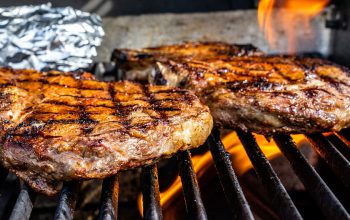Avoiding food waste at BBQs
June 8, 2023

Cooking outside on a BBQ is a great way to escape a hot stuffy kitchen during the summer months, and offers cooks the chance to soak up the sunshine and socialise with family and friends too.
For all their benefits it must be said that BBQs can be quite wasteful. Around half of BBQ hosts admit that they intentionally over cater in an attempt to impress friends and family. This alone leads to millions of pounds worth of food going to waste each year.
Over generosity isn’t the only reason BBQs can be wasteful. Cooking outside comes with some unique challenges for cooks highlighted by the top 5 most wasted BBQ foods: salad leaves, burger rolls, hot dog buns, coleslaw and potato salad. All these items have a relatively short useable life, don’t cope well with being kept outside under a hot sun, and often raise concerns for BBQ hosts when it’s time to clear up and contemplate which leftovers are worth keeping for another day and which should be thrown away.
We’ve put together some BBQ food waste prevention tips which we hope will help to save you some money and lighten the environmental impact of your al-fresco feast.
Buy and prepare the right amount of food for the number of people attending your BBQ
You could:
- Ask your guests to RSVP well in advance so you know how any people are coming.
- Ask your guests well in advance if are going to bring any food with them, and if so what foods and how much. It’s not rude, it’s helping you both to avoid unnecessary duplication, expense and wastage
- Ask your guests if they have any particular food preferences, allergies, or intolerances and cater to their needs
- Use an online portion calculator to get a sense of how much / how many of each item of food you need to keep everyone well fed, but not over-faced. Don’t be tempted to over cater “just in case”, it leads to waste
Shop smartly
You could:
- Check what foods you’ve already got in stock, and plan dishes around anything that needs using up soon
- Make a list of what and how much food you need to buy and stick to it. Or at least take a shelfie (a photo of the contents of your fridge) and consult it while grocery shopping
- Check the use by and best before labels on foods before putting them into your shopping trolley /basket, (and make sure you know the difference between the two types of labels). Only buy foods that will be within date when you intend to use them, or which you can freeze and defrost in good time
Keep your food in tip top condition for as long as possible
You could:
- Check the temperature of your fridge to make sure it’s above freezing, but below 5°C. The Chill the Fridge Out tool had advice on how to do this for a range of major appliance manufacturers
- Don’t over prepare foods in advance. Leave cobs uncut, and your salads un-dressed. Prep and cook and serve as much food to order as possible. Freshly cooked meats, crisp salads fresh out of the fridge, and freshly cut bread rolls/buns/cobs are more appealing than food that’s sat in the sunshine for a while and are less likely to go to waste
- Keep as much food inside and undercover as possible for as long as possible. Alternatively, make use of cool-boxes, ice packs, fly screens and shade to keep your food in tip top condition.
- Wilting salad leaves can often be revived with a 20 minute dip in cold water
- Slightly stale bread rolls can sometimes be revived with a brief toasting them on the grill, or a few seconds in the microwave. Staleness is caused by bread absorbing moisture in the air. A quick blast of heat is often enough to drive off the moisture and leave the bread more palatable
Deal with surplus quickly
You could:
- Avoid leaving cooked foods languishing in the sun. Get it into a containers or under wraps and in the fridge or freezer as soon as possible, ideally within an hour or so of cooking. If storing leftovers in the fridge use them within two days. Frozen cooked meats will keep indefinitely, but wrap the food well to prevent freezer burn and label it so you know what it is when it’s time to defrost it
- Ask your guests to take home any surplus you can’ store or won’t make use of. Have some containers or food wrap ready so the food is easier to transport
- Any unwanted surplus that been stored properly can be given away. Food sharing apps such as Olio offer a free, safe and easy way to connect people with surplus food to others who can make use of it
Other types of waste from BBQs
Tableware
An estimated 1.1 billion single-use plates and 4.25 billion items of single-use cutlery, most of which are plastic, are used in England each year. Just 10% are recycled on average, causing a range of environmental issues that have led to a ban on the sale of many of these items from October 2023. The best course of action is to avoid single use / disposable plates and cutlery altogether and instead use your normal tableware. If you dont have enough, you could ask attendees to bring their own plates or picnic sets, hire a party kit. or buy extra from a charity shop.
If you decide you’re going to use disposable tableware anyway, keep in mind that most can’t be recycled in Leicestershire, so place it in your black bin.
Compostable tableware is available, and can be a great alternative if you know for certain that you’ll be able to home compost it afterwards, although most of it isn’t. Please keep in mind that compostable tableware can’t be disposed of in recycling bins or garden waste collections in Leicestershire. You’ll find more information on the different types of compostable plastics and how to dispose of them on our dedicated page.
Ashes and coals
See our guide to making use of and disposing of BBQ coals and ashes safely.
Gas bottles / cannisters
If you use a gas BBQ and are unsure of what to do with your empty gas cannister(s) / bottles please be aware that you should not place them in your household waste or recycling collection as they may explode if punctured or crushed. Instead:
- Return them to the manufacturer or the retailer where you bought them. Many retailers and suppliers will allow you to return your gas bottle for a replacement, once use. For advice about Calor Gas bottles, visit the their refill, exchange and return page. For gas cylinders other than Calor Gas, read the advice on the Liquid Gas UK website
- Check to see if your local Recycling and Household Waste Site can accept them. You’ll find a list of Leicestershire sites and advice on which types of waste they accept at: https://www.leicestershire.gov.uk/environment-and-planning/waste-and-recycling/find-a-recycling-and-household-waste-site










